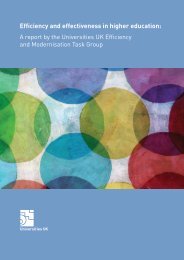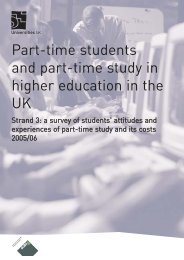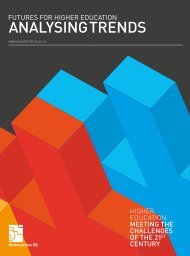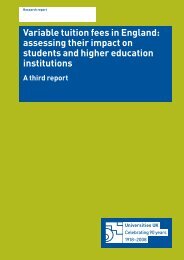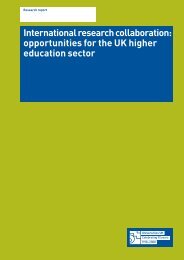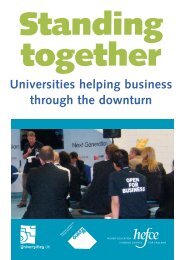The future of research - Universities UK
The future of research - Universities UK
The future of research - Universities UK
Create successful ePaper yourself
Turn your PDF publications into a flip-book with our unique Google optimized e-Paper software.
3<br />
<strong>Universities</strong> <strong>UK</strong> – <strong>The</strong> <strong>future</strong> <strong>of</strong> <strong>research</strong><br />
<strong>The</strong> <strong>future</strong> <strong>of</strong> <strong>research</strong><br />
This report looks at the <strong>future</strong> opportunities and challenges facing the <strong>UK</strong> university<br />
<strong>research</strong> base and makes recommendations as to how the system can respond to<br />
these. It comes at a time when the <strong>UK</strong> has elected its first coalition government for<br />
70 years and is facing unprecedented economic challenges. <strong>The</strong> report is aimed at<br />
policy makers within the <strong>UK</strong> (including both government and funding bodies) and<br />
more widely at the university sector and the <strong>research</strong> community. <strong>The</strong> report and<br />
its recommendations relate to the <strong>UK</strong> as a whole, including the devolved national<br />
assemblies and governments. A small number <strong>of</strong> key themes have emerged.<br />
First, the greatest contribution that the higher education<br />
<strong>research</strong> base makes in the short to medium term is through skilled, competent<br />
and able people, who train and mature in an atmosphere <strong>of</strong> <strong>research</strong> excellence.<br />
Our knowledge-based economy cannot recover and grow without a steady<br />
renewal <strong>of</strong> our stock <strong>of</strong> skills and such people are likely to be more valuable<br />
if the <strong>research</strong> to which they are exposed is at an international standard. <strong>The</strong><br />
rapid feedback process on the supply <strong>of</strong> skilled people, needs wider internal<br />
recognition and acknowledgement. <strong>The</strong> outcomes <strong>of</strong> <strong>research</strong> itself are complex,<br />
indirect, long-term and uncertain. Government should not expect, and the system<br />
should not promise, that universities will deliver specific <strong>research</strong> outcomes <strong>of</strong><br />
direct and immediate benefit to specific economic sectors, but universities should<br />
recognise and support impact wherever it occurs. Research investment creates<br />
intellectual capital <strong>of</strong> wide and flexible application to problems not yet defined.<br />
While that is happening, people acquire experience in knowledge handling and<br />
problem solving that enables them to move quickly and with great benefit into<br />
many parts <strong>of</strong> the economy.<br />
Second, <strong>UK</strong> higher education <strong>research</strong> works well when it<br />
works with partners. Those partners are found in other universities, other parts <strong>of</strong><br />
the economy and other countries. Such partners will be essential if the <strong>research</strong><br />
base is to continue to tackle major challenges, make sure that its activity is cuttingedge<br />
and relevant and keep a full appreciation <strong>of</strong> <strong>research</strong> innovation worldwide.<br />
It will be necessary for those partnerships to be more active than in the<br />
past, with clearer strategic investment, engagement and feedback. <strong>The</strong> <strong>UK</strong> will<br />
need to embrace a wider cultural and linguistic response and <strong>UK</strong> <strong>research</strong>ers<br />
must become more mobile between sectors and between countries. At the<br />
same time, government must look to stimulate more effective engagement from<br />
industry than is current. Commercial <strong>research</strong> investment has not grown at the<br />
rate that might reasonably be expected, given the quality and opportunities<br />
the <strong>UK</strong> <strong>research</strong> base provides.<br />
Third, the track record <strong>of</strong> international <strong>research</strong> excellence that<br />
is associated with the <strong>UK</strong>’s higher education <strong>research</strong> base has been supported in<br />
part by elements which may have less influence in the <strong>future</strong>. Other characteristics,<br />
such as the dual support system, are deeply embedded and central to sustained<br />
performance. As the 10 year science and innovation framework enters its final<br />
stages, it is desirable that a government strategy should emerge which addresses<br />
the timely rebalancing <strong>of</strong> some central priorities and structures, but which does<br />
so while avoiding undue changes which might undermine achievement. <strong>The</strong><br />
minimum viable size <strong>of</strong> internationally competitive <strong>research</strong> units and the role<br />
<strong>of</strong> collaborative networks to link dispersed <strong>research</strong> capacity, must be given<br />
due consideration.





